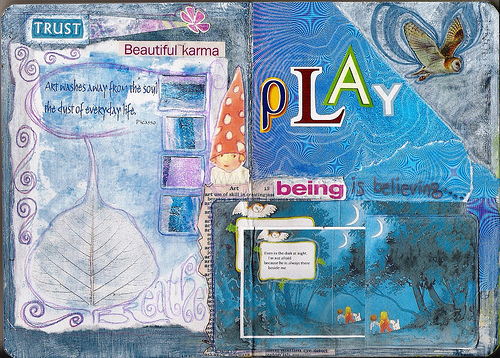April 6, 2008
Jingles, Mantras, and Catch Phrases
 Well, I’m on day four of our experiment with Play as Being, and have noticed subtle changes in my mood, disposition, and preoccupations. I really like the rhythm of this discipline – in Piet/Parma‘s words, this practice is an experiment in trading off duration for frequency.
Well, I’m on day four of our experiment with Play as Being, and have noticed subtle changes in my mood, disposition, and preoccupations. I really like the rhythm of this discipline – in Piet/Parma‘s words, this practice is an experiment in trading off duration for frequency.
Between work and school I haven’t managed to carve out significant stretches of meditative duration the past few years, but the gentle, persistent redirection of my attention is somehow more manageable, and showing positive traces. I am more confident in my decision making, better at recognizing and balancing desire and self-control, and spending more time thinking about abstract concepts and questions.
I have been very excited about this adventure, though I have self-censored and tempered my enthusiasm since I continue to be wary of the seductive siren’s song in the aesthetics of an unfamiliar media. I love learning and experiencing new things, but I sometimes have a tendency to go overboard, so I am trying to take things slow (I put myself in a lower tax bracket than my 1% cohorts – I only pause hourly, and drop by the tea house once every day or two).
With the help of a new friend that I met at PyCon, who coincidentally works at Second Life, I am appreciating the value of this type of practice in the interest of cultivating a non-judgemental awareness. Could the mainstreaming of experiences like these become the catalyst for a widespread shift in consciousness?
On the cognitive/phenomenal front, I crossed a threshold yesterday and actually experienced some SL memories. Unlike the afterimages (like after a day of playing tetris or picking mellons), these memories had a different quality. And, unlike trying to remember which page I read a story on the 2D web, these memories were vivid and real. I am realizing the ways in which an environment like this hacks my perceptual system, tuned over millennia of evolution to respond to faces and places.
This riff has me thinking alot about neural hacking, and the ways in which we all can begin to deliberately program and alter our habits and patterns of perception and interpretation (errr, I guess some people probably just call that learning 😉 ... however, the metaphor of software has perhaps pushed our understanding of flexibility and malleability farther than ever: e.g. Mind Hacks and Your Brain: The Missing Manual). I think I can make a good argument that the safest and most effective way to reprogram our consciousness is through the natural interfaces that our mind provides – namely, our natural senses.
Contrast this approach with the crude and barbaric attempts to modify mood and behaviour through pharmaceuticals. And compare this approach to the Mind Habbits “game”, which begins with the design question “Can we design an interactive multimedia experience designed to make people feel better?”
My work and studies have been conditioning me to be more deliberate and purposeful in my use and design of technology. Second Life continues to present affordances and opportunities for learning and growth, but I still haven’t heard that many stories of this kind of targeted exploration, which specifically leverage’s the unique advantages of an immersive experience. There must be conversations like this happening in serious gaming circles, though in many ways, this project demonstrates that it isn’t the game that needs to be serious, rather the attitude, approach, and context that the participants bring to the table.
Finally, here is an enumeration of some of the networks of concepts that this project has activated for me:
- Merleau-Ponty’s phenomenology, especially his inverted vision experiments
- Stephen Kern’s exploration of the shifting phenomenology around time and space at the turn of the last century
- Wolfgang Schivelbusch detailed examination of the railroad, and the new experiences and perceptions it brought
- Dan Gilbert Stumbling on Happiness, where amongst other ideas, explores the neuro-psychological/phenomenological overlap between vision, imagination, and memory
- Itzhak Bentov’s Wild Pendulum, holographic reality, and subjective time
- Stan Brakhage’s films and writings
- Daniel Pinchbeck’s popularization of reality as a manifestation of will
- Meru Foundation’s synthesis of kabbalistic perspectives on the relationship between consciousness and physical reality.
- The Global Consciousness Project
Quite a fun web of ideas to be snared in.
/play as being
 Filed by jonah at 2:07 pm under earth,ethics,metaphysics,playasbeing,water
Filed by jonah at 2:07 pm under earth,ethics,metaphysics,playasbeing,water
No Comments

